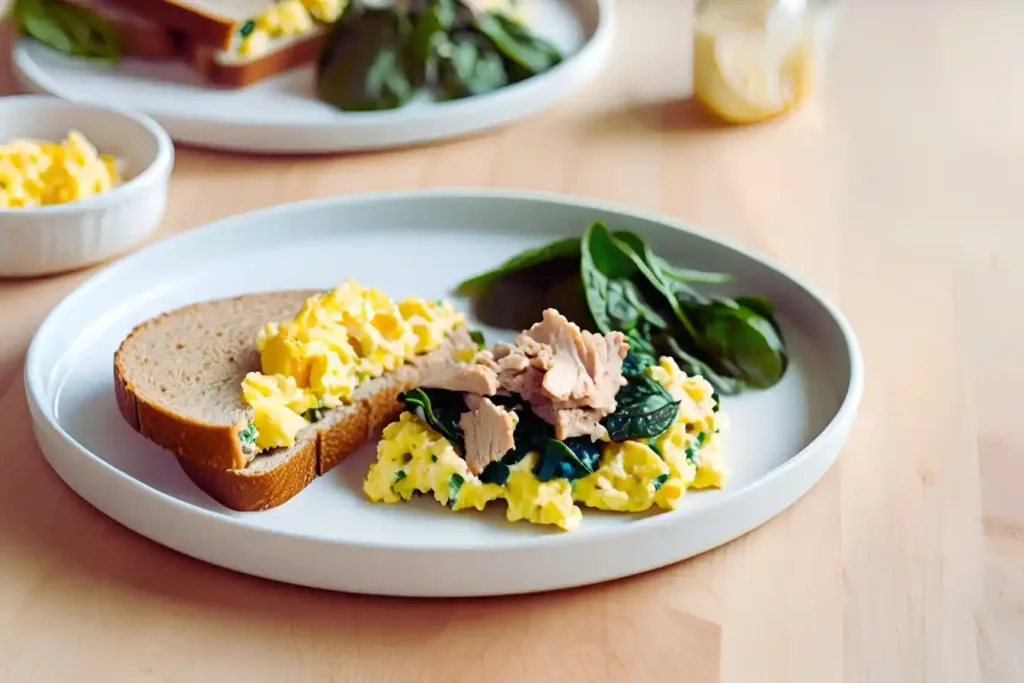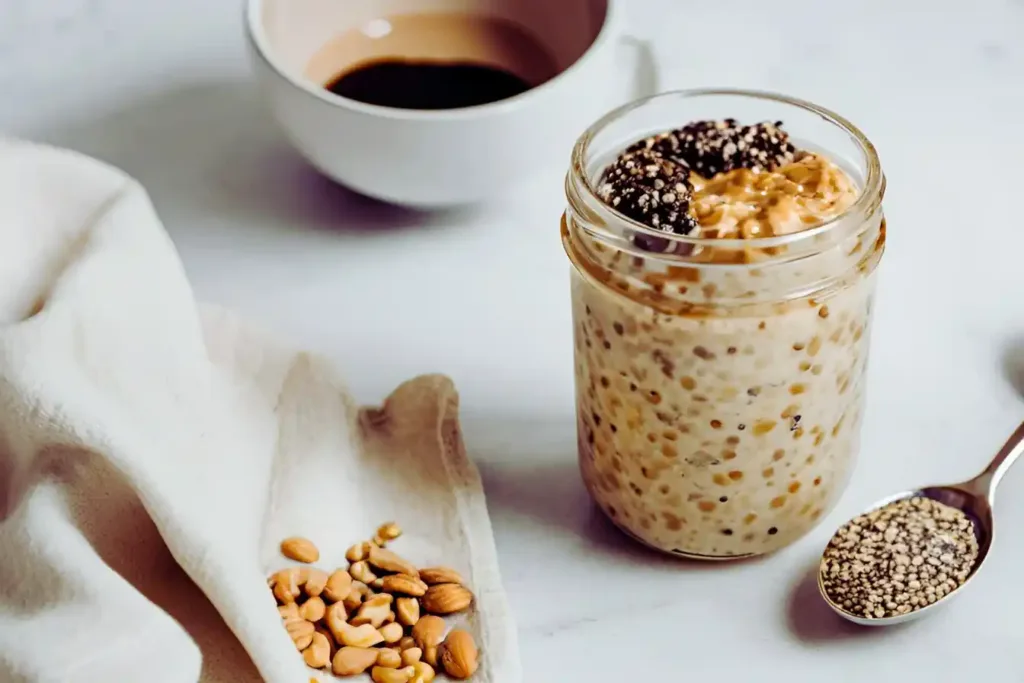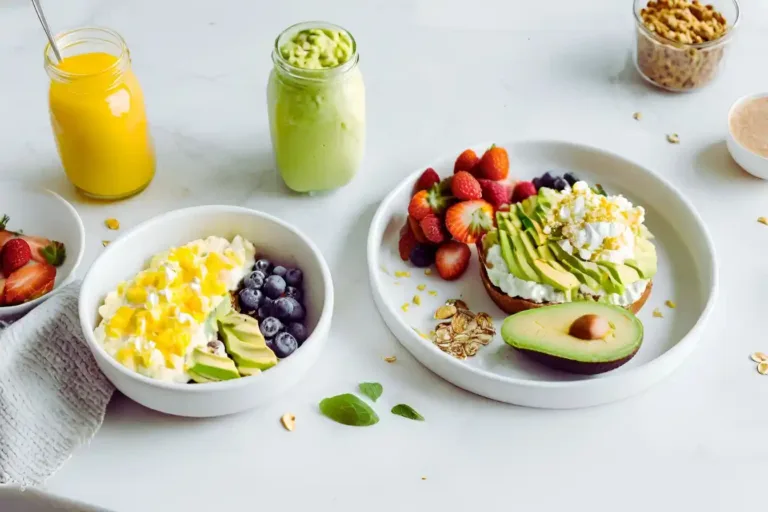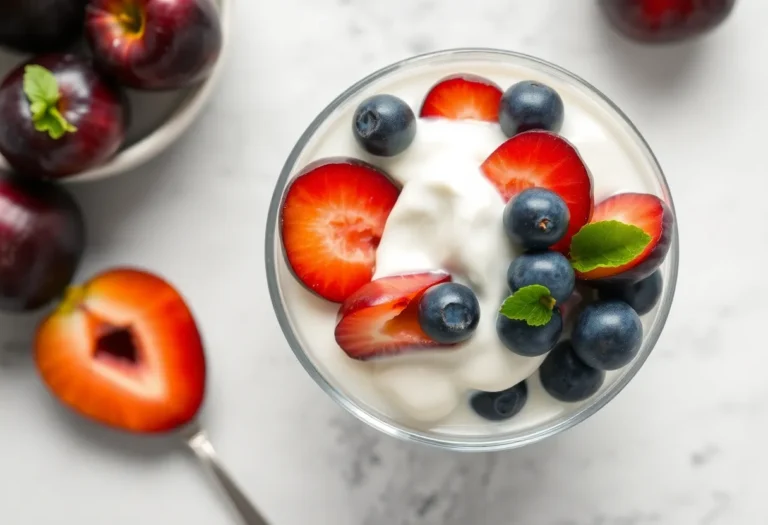When you hear “high-protein breakfast,” do you just picture a boring plate of eggs? It’s time to think bigger. From creamy, decadent parfaits to savory, plant-based bowls, a protein-packed morning is more diverse and delicious than you ever imagined.
Why High Protein Breakfasts Are Essential for Your Morning
The Role of High Protein Breakfasts in Energy and Satiety
Starting your day with high protein breakfasts is one of the best ways to fuel your body and stay energized throughout the morning. Protein not only helps stabilize blood sugar levels but also keeps you feeling full for longer, making it a key component of a healthy and balanced breakfast. Without enough protein in the morning, you may find yourself battling hunger and energy crashes before lunchtime. Whether you’re looking for protein-rich breakfasts to manage weight, boost energy, or support fitness goals, making the right choices early in the day can set you up for success.
How Protein-Rich Breakfasts Support Weight Management
In fact, Incorporating protein into your breakfast can be a great help for those who are watching their weight, such as with these ground turkey meal prep ideas. This is because protein helps to manage your appetite, and therefore, you are less likely to overeat later on. In addition, when you eat enough protein, your body uses more energy to digest it. Consequently, this small increase in calorie burn can help with weight management in the long run. So, if you’re looking for an easy way to stay on track with your weight goals, adding some extra protein to your breakfast is a good way to go.
Who Benefits Most from Protein-Rich Breakfasts?

Athletes and Fitness Enthusiasts
For those of you who enjoy staying active, starting the day with a high protein breakfast can really help with your physical goals. In particular, protein is vital for muscle repair and growth after your workouts. Moreover, getting enough protein in the morning ensures that your muscles have what they need to recover quickly. Also, the sustained energy from protein can help you power through your training sessions.
Individuals on Weight Loss Diets
Similarly, people who are on a weight loss diet can benefit from having a high protein breakfast. Indeed, as we mentioned earlier, protein helps to keep you feeling full. Because of this, you are less likely to snack between meals. This control over your appetite and snacking can help you reduce your overall calorie intake. In fact, focusing on protein can make your weight loss journey much easier.
People Managing Diabetes or Blood Sugar Levels
For those managing diabetes or blood sugar levels, protein at breakfast is extra beneficial, such as including foods from these healthy on-the-go ideas. Therefore, it helps regulate blood sugar, preventing drastic spikes after eating. Furthermore, this steady release of energy from protein means you’re less likely to have those afternoon energy crashes that can lead to unhealthy food choices.
Common Myths About High Protein Breakfasts
Do High Protein Breakfasts Make You Bulk Up? Fact vs. Fiction
On the other hand, many people worry that eating a lot of protein will make them bulk up, but that’s not true for most of us. Therefore, building significant muscle mass requires a specific type of training combined with a very high-calorie, high-protein diet. In addition, for the average person, incorporating protein into breakfast is more about feeling full and energized rather than adding bulk.
Skipping Protein-Rich Breakfasts: Is It Okay to Eat Protein Later in the Day?
Another myth is that it’s okay to skip breakfast if you eat protein later in the day. However, that’s not necessarily the best practice. In fact, starting your day with protein kicks off your metabolism and helps you stay energized and focused throughout the morning. Also, skipping breakfast might make you hungrier later on. So, for overall health and well-being, a good breakfast with enough protein is still a great habit.
Understanding Protein Needs for High Protein Breakfasts
Recommended Protein Intake for Morning Protein Recipes
Now, let’s talk a bit about how much protein you actually need. Generally, the recommended daily protein intake for an average adult is around 0.8 grams per kilogram of body weight. However, depending on your activity level and goals, this number can go up. For example, if you’re very active, you might need even more. Therefore, a good starting point for breakfast is to aim for about 20 to 30 grams of protein. In addition, this can help you meet your daily requirements and give you a great start to the day.
How to Incorporate 30-40g of Protein into Breakfast
Getting 30-40 grams of protein into your breakfast might seem like a lot, but it’s definitely achievable with some planning. In fact, you don’t need to eat a huge amount of food to reach this goal. For instance, you can combine different protein sources in your meal to reach your goals. Moreover, it’s about choosing the right foods. So, rather than thinking of it as a big task, see it as a chance to create delicious and balanced meals.
Combining Protein Sources for Maximum Benefit
Combining different protein sources not only helps you reach your daily goals but also makes your breakfast more nutritious. For example, a meal with eggs (animal protein) and seeds (plant protein) provides a well-rounded mix of essential amino acids. Moreover, different protein sources provide different nutrients. So, including a variety can benefit your health in a number of ways.
Benefits of Protein-Rich Breakfasts for Energy and Weight Goals
Sustained Energy Levels Throughout the Day
As we have discussed, eating a high protein breakfast is like fueling your body with a slow-burning fuel. Therefore, the protein in your breakfast provides a steady source of energy throughout the morning. On the other hand, if you eat a breakfast high in sugars or simple carbs, you are likely to experience a quick energy spike followed by a crash. In addition, this steady energy from protein helps you avoid feeling sluggish and keeps you focused on your tasks.
Improved Muscle Recovery and Growth
If you’re someone who enjoys a good workout, or even a short walk, it’s beneficial to include protein in your breakfast. In fact, protein is essential for repairing and building muscle tissue after exercise. Moreover, having a protein-rich meal soon after waking up helps kick-start the muscle repair process. Furthermore, the benefits of morning protein are especially important for those who have worked out the night before.
Reduced Mid-Morning Hunger and Snacking
One of the biggest benefits of high protein breakfasts is that they help you feel full for a long time. Therefore, you’re less likely to reach for unhealthy snacks or overeat before lunch. Consequently, this can make it easier to stay on track with your diet. Moreover, having a satiating breakfast is a small step that can make a big difference to your overall diet.
Nutritional Breakdown of Common Protein Sources
Eggs: The Breakfast Protein Staple
Eggs are a classic breakfast food, and for good reason. In fact, they are a fantastic source of high-quality protein, providing about 6-7 grams of protein per egg. Additionally, they’re packed with other nutrients like vitamins and minerals, which makes them a powerhouse for your health. Moreover, there are many ways to prepare eggs. So, it’s easy to include them in your daily routine.
Plant-Based Proteins: Tofu, Tempeh, and Lentils
For those of you who follow a plant-based diet, there are many other options. Indeed, tofu, tempeh, and lentils are wonderful sources of protein, and they’re also versatile and affordable. In addition, these foods can be cooked in a variety of ways. So, it’s easy to make a delicious and nutritious meal that meets your needs.
High-Protein Dairy: Greek Yogurt, Cottage Cheese, and Milk Alternatives
Dairy products like Greek yogurt and cottage cheese are also great for adding protein to your breakfast. Indeed, Greek yogurt, in particular, is a good option, as it has a high amount of protein, usually around 15-20 grams per cup. In addition, for those who avoid traditional dairy, many plant-based milk options offer a good amount of protein. Furthermore, they are often enriched with essential vitamins and minerals.
Packaged Protein Options: Powders and Bars
Packaged protein options like protein powders and bars can be a useful way to boost your protein intake. However, it’s important to read the labels carefully and choose options with minimal added sugar and artificial ingredients. Therefore, these products can be a good choice for busy mornings when you don’t have much time to cook. However, they shouldn’t be your only source of protein, as whole foods provide additional benefits.
Quick and Easy High Protein Breakfast Recipes

Classic Breakfasts with a Protein Twist
Scrambled Eggs with Spinach and Turkey
Scrambled eggs with spinach and turkey are one of the easiest high-protein breakfasts you can make. Indeed, by adding a handful of spinach and a few slices of turkey, you not only boost the protein but also add extra nutrients to your meal. Furthermore, it’s a quick and easy way to get a good start to your day. In addition, the preparation is quick, so it’s perfect for busy mornings.
Greek Yogurt Parfait with Nuts and Seeds
For a refreshing and protein-packed breakfast, consider a Greek yogurt parfait. Moreover, simply layer Greek yogurt with your favorite fruits, then sprinkle with a mix of nuts and seeds. In fact, nuts and seeds add healthy fats and additional protein. Furthermore, this parfait is a great option for a light yet filling breakfast. Therefore, you can make it ahead of time and store it in the fridge.
Plant-Based High Protein Breakfasts
Tofu Scramble with Veggies

If you are looking for a plant-based option, a Tofu scramble is a fantastic choice for a plant-based option. Indeed, by crumbling the tofu and sautéing it with colorful veggies like bell peppers, onions, and mushrooms, you can create a savory and protein-rich breakfast. In addition, adding some turmeric or other spices can boost the flavor even more. Therefore, it’s a versatile and nutritious breakfast for everyone.
Peanut Butter and Chia Overnight Oats
Overnight oats are a convenient and nutritious breakfast. Moreover, by adding a spoonful of peanut butter and some chia seeds, you create a breakfast that is not only rich in fiber but also packed with protein. Furthermore, chia seeds are a great source of omega-3 fatty acids. Therefore, this is a perfect breakfast to prepare the night before.
Grab-and-Go High Protein Options

Smoothies Packed with Protein Powder and Nut Butters
Smoothies are perfect for those who need a quick and convenient breakfast on the go. In fact, by blending fruits, vegetables, a scoop of protein powder, and a tablespoon of nut butter, you can create a nutritious and protein-rich smoothie in no time. Moreover, this is a great way to get a balance of nutrients and protein in a drinkable form. In addition, you can use different combinations of fruits and vegetables to keep your smoothies interesting.
Hard-Boiled Eggs with String Cheese and an Apple
For a simple and portable breakfast, consider hard-boiled eggs with string cheese and an apple. Moreover, Hard-boiled eggs provide a good amount of protein, while string cheese adds a little extra. Furthermore, an apple provides fiber and essential nutrients. Therefore, this is an ideal option for a quick breakfast on those busy days when you are running out the door.
High Protein Breakfast for Meal Preppers
Breakfast Burritos with Beans and Eggs
Breakfast burritos are a great way to meal prep for the week. Indeed, by combining scrambled eggs with beans, salsa, and your favorite veggies, you can create a filling and protein-rich breakfast that is easy to reheat. Furthermore, these can be prepared in advance and stored in the fridge or freezer. Therefore, this option is perfect for those who like to plan ahead.
Quinoa and Veggie Breakfast Bowls
Quinoa is a complete protein, making it a great base for breakfast bowls. Moreover, you can combine cooked quinoa with roasted vegetables, a drizzle of olive oil, and a sprinkle of feta cheese for a delicious and nutritious breakfast. Furthermore, this bowl is packed with nutrients and keeps you full for hours. So, you can customize the veggies and toppings based on what you prefer.
Tips for Increasing Protein in Traditional Breakfasts
Swapping Ingredients for Higher Protein Alternatives
Whole-Grain Toast to Protein Bread
One way to easily boost your protein intake is by swapping some traditional breakfast items for their higher protein alternatives. For instance, using protein bread instead of regular whole-grain toast can significantly increase the amount of protein in your breakfast. In addition, this small change can make a big difference over time. Therefore, always check the nutritional labels to choose the best options.
Adding Nuts or Seeds to Cereals
If you enjoy a bowl of cereal in the morning, try adding a handful of nuts or seeds. Therefore, this can greatly increase the protein and nutrient content of your breakfast. Furthermore, the added crunch from nuts and seeds is very satisfying. Moreover, it’s a quick and easy way to make your meal more balanced.
Using Protein Powders Effectively
Protein powders can be a useful tool for adding protein to your breakfast. In fact, you can mix it into your smoothies, oatmeal, or even your yogurt. Moreover, it’s a great way to boost the protein content of your favorite meals, especially if you’re struggling to get enough protein from your diet. Therefore, choose a protein powder that fits your preferences and dietary needs.
Enhancing Your Coffee with Protein Creamers
There are now many protein-rich coffee creamers available that can help you boost your morning protein intake. In addition, adding one of these creamers to your morning coffee is an easy way to get some extra protein with your favorite morning beverage. Therefore, check the labels to make sure they have good nutritional value.
Challenges of a High Protein Breakfast and How to Solve Them
Balancing Protein with Other Nutrients
While protein is important, it’s also crucial to balance it with other nutrients like carbohydrates and healthy fats. Indeed, it’s best to create a breakfast that provides a mix of protein, complex carbs, and healthy fats. This will help you feel full and provide you with the energy you need for the day.
Overcoming Cost and Accessibility Concerns
Sometimes, getting enough protein can be expensive or challenging depending on your location. Therefore, it’s beneficial to focus on affordable protein sources like eggs, lentils, and beans. Furthermore, it is possible to have a high-protein breakfast without spending a lot of money. So, planning and preparing meals ahead can also help with this challenge.
FAQs About High Protein Breakfasts Ideas
What Are Good High Protein Breakfasts?
Good high-protein breakfasts are those that include a sufficient amount of protein, which is usually between 20 to 40 grams. In fact, this helps to keep you feeling full and energized throughout the morning. Moreover, they should be easy to prepare and enjoyable for you.
Examples for Omnivores and Vegans
For omnivores, options like scrambled eggs with turkey, Greek yogurt with nuts and seeds, and breakfast burritos are great. On the other hand, for vegans, tofu scrambles, peanut butter overnight oats, and smoothies with protein powder are excellent alternatives. Furthermore, these options are all packed with protein and other essential nutrients. In addition, you can customize these to your own needs.
How Can I Get 40g of Protein for Breakfast?
Getting 40 grams of protein at breakfast is completely achievable. In fact, you just need to be strategic about combining your protein sources. For instance, you can use a combination of eggs, Greek yogurt, and protein powder in a smoothie to reach that goal. Moreover, you can also combine plant-based sources to reach your goal.
Practical Meal Plans and Ingredient Lists
A meal plan for 40 grams of protein could look like this:
Scrambled Eggs with Turkey and Cheese: 3 eggs (about 20g of protein), 2 slices of turkey (about 10g of protein), and 1 oz of cheese (about 7g of protein)
Greek Yogurt with Nuts and Seeds: 1 cup of Greek yogurt (about 20g of protein), 1/4 cup of almonds (about 7g of protein), and 2 tablespoons of chia seeds (about 5g of protein).
Protein Smoothie: 1 scoop of protein powder (about 25g of protein), 1 cup of spinach, 1/2 cup of berries, 1 tablespoon of nut butter (about 4g of protein), and 1 cup of milk.
These are just examples and can be modified based on your preference and dietary needs.
What Are Quick High Protein Breakfasts for Busy Mornings?
For busy mornings, you need breakfast ideas that are quick and easy to prepare. Indeed, options such as smoothies, overnight oats, and hard-boiled eggs are perfect choices. Moreover, these can be prepared in a few minutes or ahead of time, so you’re ready to go. In addition, this is important for those of you with a busy schedule.
Follow Lazy Meal Prep on your favorite platform and become part of our cozy kitchen crew:
- Instagram – for behind-the-scenes peeks and weekday inspiration
- Facebook – to swap ideas, tips, and share what you’re cooking
- Pinterest – to save and plan your week the lazy-smart way
Let’s make cooking easier, together—one delicious bite at a time.




